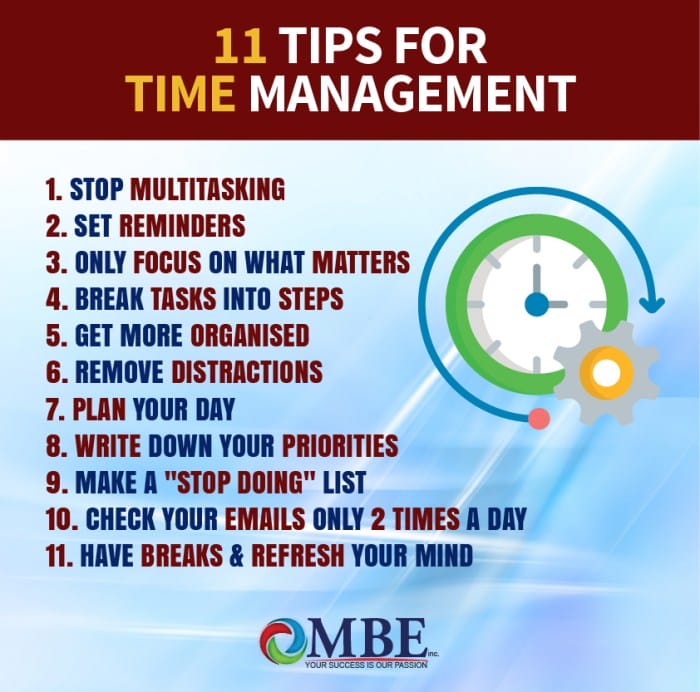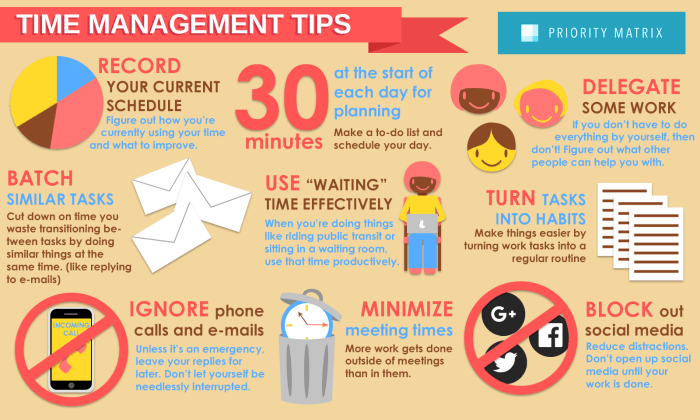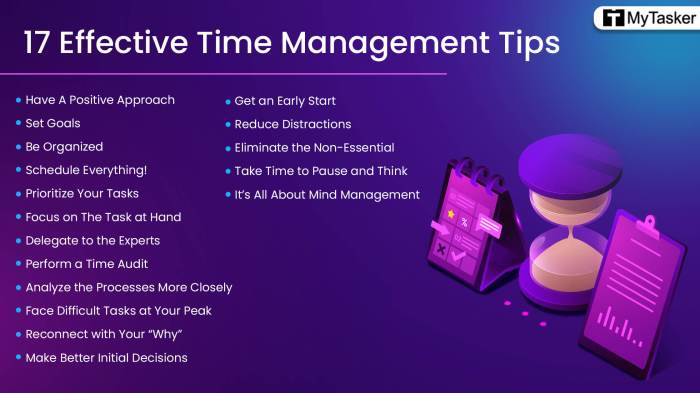In the fast-paced world of insurance, time management is a crucial skill that can make all the difference between success and struggle. With countless tasks, appointments, and client interactions to juggle, insurance agents need effective strategies to stay organized, productive, and focused.
This comprehensive guide explores ten essential tips to help insurance agents master their time management skills, boost productivity, and achieve their goals.
From prioritizing tasks and setting boundaries to leveraging technology and taking regular breaks, this guide provides a wealth of practical advice and actionable strategies. Insurance agents will discover how to streamline their workflow, minimize distractions, and create a personalized time management plan that aligns with their unique work style and priorities.
Get ready to transform your time management skills and unlock your full potential as an insurance agent.
Prioritize Tasks

Effective time management in the insurance industry requires strategic prioritization of tasks. Begin by categorizing tasks into four quadrants: important and urgent, important but not urgent, urgent but not important, and neither important nor urgent. Focus on tasks that are both important and urgent, followed by those that are important but not urgent.
Delegate or defer tasks that are urgent but not important, and eliminate those that are neither important nor urgent.
Create a To-Do List
To stay organized and ensure that important tasks are completed, create a daily or weekly to-do list. Break down large tasks into smaller, manageable steps to make them less daunting and easier to accomplish. Use a planner or digital task management tool to keep track of your tasks and deadlines.
Time Blocking
Allocate specific time slots for different tasks or activities throughout your day. This technique, known as time blocking, helps you stay focused and avoid distractions. During each time block, concentrate solely on the task at hand and minimize multitasking.
Delegate and Outsource
Recognize your limitations and delegate tasks that can be efficiently handled by others. This frees up your time to focus on more important and strategic responsibilities. Consider outsourcing certain tasks to external providers who specialize in those areas.
Avoid Procrastination
Procrastination can lead to missed deadlines and increased stress. To combat this, tackle challenging tasks early on and break them down into smaller, more manageable steps. Set realistic deadlines for yourself and avoid distractions that may hinder your progress.
Take Breaks
Regular breaks throughout the day can improve your focus and productivity. Step away from your work, stretch, or engage in a brief mindfulness exercise to recharge and return to your tasks with renewed energy and clarity.
Time Blocking
Time blocking is a time management technique that involves dividing your day into specific blocks of time, each dedicated to a particular task or activity. This method can help you stay focused, reduce distractions, and increase your productivity. It’s particularly useful for insurance agents who often have multiple tasks and appointments to manage.
Benefits of Time Blocking:
- Improved Focus: By dedicating specific time blocks to specific tasks, you can avoid multitasking and stay focused on one thing at a time.
- Increased Productivity: Time blocking can help you work more efficiently by eliminating distractions and interruptions during your dedicated work periods.
- Better Time Management: Time blocking allows you to plan your day in advance, ensuring that you allocate enough time for all your important tasks and activities.
- Reduced Stress: When you know exactly what you need to do and when you need to do it, you’re less likely to feel overwhelmed or stressed.
Creating a Time Blocking Schedule:
- List Your Tasks: Start by making a list of all the tasks and activities you need to complete each day.
- Estimate Time Requirements: Next, estimate how much time each task will take to complete.
- Create Time Blocks: Divide your day into specific time blocks, allocating enough time for each task on your list.
- Schedule Breaks: Remember to include breaks in your schedule to avoid burnout and maintain focus.
- Be Flexible: While it’s important to stick to your schedule as much as possible, be flexible enough to adjust it when necessary.
Examples of Time Blocking for Insurance Agents:
- Client Meetings: Allocate specific time blocks for client meetings, allowing enough time for preparation, travel, and follow-up.
- Prospecting: Dedicate time blocks to prospecting for new clients, including making phone calls, sending emails, and networking.
- Policy Review: Schedule regular time blocks to review existing policies and identify opportunities for upselling or cross-selling.
- Administrative Tasks: Set aside time blocks for administrative tasks such as data entry, filing, and responding to emails.
- Professional Development: Allocate time blocks for continuing education, reading industry publications, and attending conferences.
Use Technology

In the modern insurance landscape, technology plays a pivotal role in streamlining operations and enhancing productivity. Embracing the right tools and apps can help insurance agents save time, improve efficiency, and deliver exceptional client service.
Technology for Time-Saving
A multitude of time-saving technology tools and apps are tailored specifically for insurance agents. These tools can automate mundane tasks, schedule appointments, manage client communication, and streamline administrative processes. By leveraging these technological advancements, agents can focus their time and energy on more strategic and revenue-generating activities.
Automation of Tasks
Technology enables the automation of repetitive and time-consuming tasks, such as data entry, policy renewals, and claims processing. Automated systems can handle these tasks quickly and accurately, freeing up agents to concentrate on building relationships with clients and growing their business.
Efficient Scheduling
Technology provides robust scheduling tools that allow agents to easily manage their appointments and meetings. These tools offer features like calendar integration, reminders, and notifications, ensuring that agents stay organized and punctual. Additionally, online scheduling platforms enable clients to book appointments at their convenience, enhancing the overall customer experience.
Streamlined Client Communication
Technology facilitates seamless communication between agents and clients. Email, instant messaging, and video conferencing platforms enable agents to respond to client inquiries promptly and efficiently. Furthermore, customer relationship management (CRM) systems provide a centralized platform for managing client interactions, tracking communication history, and storing important client information.
Administrative Tasks
Technology can streamline administrative tasks such as policy management, billing, and claims processing. Insurance software can automate these processes, reducing the risk of errors and increasing overall efficiency. Additionally, cloud-based storage solutions allow agents to securely store and access client information from anywhere, anytime.
Set Boundaries

As an insurance agent, maintaining a healthy work-life balance is crucial to long-term success and well-being. Establishing clear boundaries between work and personal life can help manage client expectations, avoid overcommitment, and create a dedicated workspace.
Managing Client Expectations
Communicating expectations with clients is essential. Set realistic timelines for responding to inquiries and completing tasks. Avoid promising immediate availability or unrealistic turnaround times.
Encourage clients to schedule appointments during business hours to minimize disruptions to your personal time. Be assertive in declining requests for meetings or calls outside of designated work hours.
Avoiding Overcommitment
Prioritizing tasks and managing time effectively can help prevent overcommitment. Assess your workload regularly and decline additional responsibilities if necessary.
Learn to say no to new projects or tasks if you’re already at capacity. It’s okay to explain to clients that you have limited availability and need to focus on existing commitments.
Creating a Dedicated Workspace
Having a dedicated workspace can help maintain a clear separation between work and personal life. If possible, set up a home office or designated area for work-related activities.
Keep your workspace organized and free of distractions. Consider investing in noise-canceling headphones or earplugs to minimize interruptions.
Delegate Tasks
As an insurance agent, time management is crucial to handle multiple responsibilities effectively. Delegating tasks can be a valuable strategy to free up your time and improve productivity.
Delegating tasks to team members or virtual assistants can bring several benefits: it allows you to focus on high-priority activities, improves team collaboration, enhances team members’ skills, and reduces your workload.
Identifying Tasks for Delegation
To effectively delegate tasks, you need to identify tasks that can be delegated. Consider tasks that are routine, time-consuming, or fall outside your expertise. It’s also important to assess the skills and capabilities of your team members to ensure they can handle the delegated tasks.
Communicating Expectations
Once you’ve identified tasks for delegation, clearly communicate your expectations to the individuals or teams responsible for them. Provide detailed instructions, set clear deadlines, and ensure that they understand the desired outcomes. Regular communication is key to ensure that tasks are completed as per your expectations.
Managing and Monitoring Delegated Tasks
To ensure the quality and timely completion of delegated tasks, it’s essential to have a system for managing and monitoring them. This could involve using project management tools, setting regular check-ins, and providing feedback to team members. By actively managing delegated tasks, you can ensure that they are completed efficiently and effectively.
Eliminate Time Wasters

In the insurance industry, time is a valuable asset. To maximize productivity and achieve success, it is crucial to identify and eliminate common time wasters that can hinder your progress. By minimizing distractions, reducing interruptions, and overcoming procrastination, you can stay focused, maintain productivity, and make the most of your workday.
Identify Common Time Wasters
The first step towards eliminating time wasters is to identify them. Some common distractions that insurance agents often face include:
- Excessive use of social media and personal emails during work hours.
- Unnecessary meetings and phone calls that could have been handled through email or other means of communication.
- Disorganized workspaces and lack of a clear to-do list.
- Procrastination and the tendency to postpone important tasks.
- Lack of clear boundaries between work and personal life, leading to distractions and interruptions.
Minimize Distractions and Interruptions
Once you have identified the common time wasters, it is important to take steps to minimize them. Here are some practical tips:
- Set aside specific times for checking emails and social media, and avoid doing so during peak work hours.
- Use tools like website blockers or apps that limit access to distracting websites during work hours.
- Create a dedicated workspace that is free from distractions and interruptions.
- Communicate your availability to colleagues and clients, and set boundaries to avoid unnecessary interruptions.
- Use tools like noise-canceling headphones or earplugs to block out distractions and maintain focus.
Overcome Procrastination
Procrastination is a common time waster that can significantly hinder productivity. To overcome procrastination, it is important to:
- Break down large tasks into smaller, more manageable steps.
- Set realistic deadlines for each task and stick to them.
- Reward yourself for completing tasks on time or ahead of schedule.
- Avoid perfectionism and focus on making progress rather than achieving perfection.
- Seek support from colleagues or mentors when feeling overwhelmed or stuck.
Maintain Focus and Productivity
Staying focused and maintaining productivity throughout the workday is essential for achieving success. Here are some strategies to help you do so:
- Start each day with a clear to-do list and prioritize tasks based on importance and urgency.
- Take regular breaks to avoid burnout and maintain focus.
- Use time management techniques like the Pomodoro Technique to work in focused intervals followed by short breaks.
- Set aside specific times for checking emails and phone calls, and avoid doing so during peak work hours.
- Use tools and apps that help you track your time and stay organized.
Batch Similar Tasks
Efficiency and productivity are the keys to successful time management for insurance agents. Batching similar tasks together is a powerful technique that can help you streamline your workflow, save time, and reduce stress.
When you batch similar tasks, you group them together and complete them in one go. This allows you to maintain focus, minimize distractions, and avoid the time-consuming task switching that can eat into your productivity.
Benefits of Batching Similar Tasks
- Increased efficiency: By focusing on one type of task at a time, you can enter a flow state and work more efficiently.
- Reduced distractions: When you’re not constantly switching between tasks, you’re less likely to get distracted and lose focus.
- Improved time management: Batching tasks helps you allocate your time more effectively and avoid wasting time on unproductive activities.
- Reduced stress: When you’re able to complete tasks in batches, you feel a sense of accomplishment and reduce the feeling of being overwhelmed.
Examples of Batching Similar Tasks for Insurance Agents
- Processing claims: Instead of handling claims as they come in, set aside a specific time each day to process multiple claims at once.
- Following up with clients: Group together clients who need follow-up calls or emails and reach out to them all at once.
- Renewing policies: Schedule a time each month to renew multiple policies at once, rather than doing them sporadically.
- Marketing and outreach: Plan a day each week to create social media posts, send out newsletters, and connect with potential clients.
Tips for Creating a Batching Schedule and Staying Organized
- Identify your tasks: Make a list of all the tasks you need to complete each week.
- Group similar tasks together: Categorize your tasks into similar groups, such as administrative tasks, client-related tasks, marketing tasks, and so on.
- Schedule your batches: Allocate specific times each day or week to work on each batch of tasks.
- Stay organized: Use tools like task management apps, calendars, and to-do lists to keep track of your batches and deadlines.
- Take breaks: It’s important to take short breaks throughout the day to avoid burnout and maintain focus.
Take Regular Breaks

Maintaining focus and productivity throughout the day requires strategic breaks. Regular breaks help refresh the mind, reduce fatigue, and prevent burnout. By incorporating breaks into your schedule, you can improve your overall performance and well-being.
Scheduling Breaks
Plan breaks throughout your day, ideally every 60-90 minutes. Short breaks of 5-10 minutes can help you recharge and return to your tasks with renewed focus. Consider using the Pomodoro Technique, where you work for 25 minutes and then take a 5-minute break.
This structured approach can help you stay on track and avoid prolonged periods of intense work.
Continuously Improve

In the dynamic insurance industry, staying competitive requires a commitment to continuous improvement and learning. Insurance agents must regularly assess their time management practices, identify areas for improvement, and adopt new strategies to enhance their productivity and effectiveness.
To achieve this, agents should:
Identify Areas for Improvement
- Regularly review time management practices: Analyze how time is spent throughout the day, identifying tasks that take up excessive time or could be streamlined.
- Seek feedback from colleagues and clients: Constructive criticism can help identify areas where time management can be improved.
- Monitor industry trends: Stay informed about emerging technologies and best practices that can enhance productivity.
Stay Updated with Industry Trends
- Attend industry conferences and webinars: These events provide valuable insights into the latest trends and developments.
- Read industry publications and blogs: Stay informed about new products, services, and regulations.
- Network with peers: Exchange ideas and learn from other insurance professionals.
Adopt New Technologies
- Embrace technology: Utilize tools and software that can automate tasks, streamline processes, and improve communication.
- Experiment with new technologies: Be open to trying new tools and technologies that can enhance productivity.
- Continuously learn: Invest in ongoing education to stay updated on the latest technological advancements.
Personalize Time Management Strategies

Time management strategies are not one-size-fits-all. What works for one person may not work for another. The key to effective time management is to tailor your strategies to your individual preferences and work style.
Assessing Personal Strengths and Weaknesses
The first step to personalizing your time management strategy is to assess your personal strengths and weaknesses. What are you good at? What do you struggle with? Once you know your strengths and weaknesses, you can start to develop strategies that capitalize on your strengths and minimize your weaknesses.
Creating a Personalized Time Management Plan
Once you have assessed your personal strengths and weaknesses, you can start to create a personalized time management plan. This plan should be based on your individual goals and priorities. It should also be flexible enough to allow for unexpected events.Here
are some tips for creating a personalized time management plan:
- Set clear goals and objectives.
- Prioritize your tasks.
- Create a schedule and stick to it.
- Take breaks throughout the day.
- Review and adjust your plan as needed.
By following these tips, you can create a personalized time management plan that will help you achieve your goals and objectives.
Last Recap

In conclusion, mastering time management is a game-changer for insurance agents. By implementing these ten strategies, agents can optimize their workflow, enhance productivity, and achieve a healthy work-life balance. Prioritizing tasks, utilizing technology, setting boundaries, delegating tasks, and continuously improving are key elements of effective time management.
Remember, the key is to find a balance that works for you and to make adjustments as needed. Embrace these strategies and watch your productivity soar as you navigate the dynamic world of insurance with confidence and success.
FAQ
What is the most important time management tip for insurance agents?
Prioritizing tasks based on importance and urgency is the foundation of effective time management. It ensures that agents focus on the most critical tasks first and avoid getting sidetracked by less important matters.
How can insurance agents effectively use technology to improve their time management?
Insurance agents can leverage technology tools and apps to automate tasks, schedule appointments, manage client communication, and streamline administrative tasks. This can save time and allow agents to focus on more value-added activities.
What is the best way for insurance agents to set boundaries between work and personal life?
Setting clear boundaries between work and personal life is essential for insurance agents to avoid burnout and maintain a healthy work-life balance. This includes managing client expectations, creating a dedicated workspace, and sticking to a regular work schedule.
How can insurance agents identify tasks that can be delegated to others?
Insurance agents can identify tasks that can be delegated by considering tasks that are routine, time-consuming, or outside their core competencies. Delegating these tasks to team members or virtual assistants can free up time for agents to focus on more strategic and revenue-generating activities.
What are some strategies for insurance agents to stay focused and avoid distractions during the workday?
Insurance agents can stay focused and avoid distractions by creating a dedicated workspace, minimizing multitasking, taking regular breaks, and using time-blocking techniques. Additionally, eliminating common time wasters such as excessive social media use and unnecessary meetings can help agents maintain productivity throughout the day.



